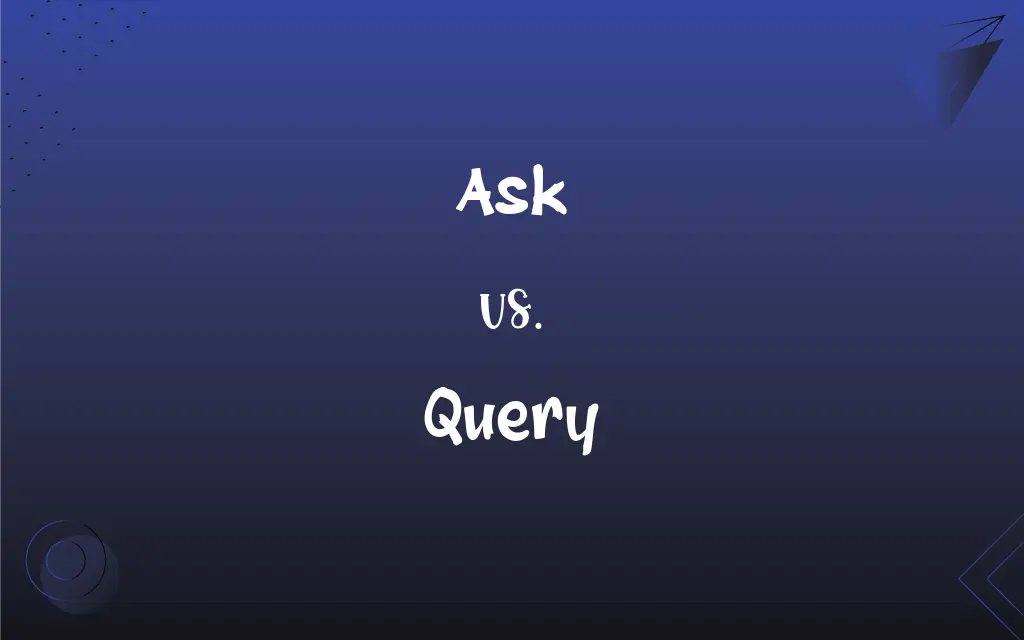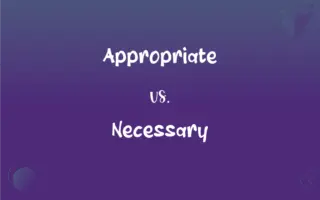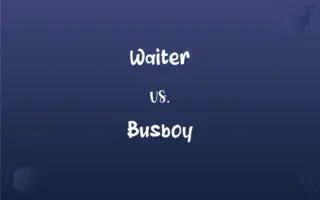Ask vs. Query: What's the Difference?
Edited by Aimie Carlson || By Harlon Moss || Updated on November 8, 2023
"Ask" means to request an answer or information, while "query" is a question, especially one addressed formally to an official or organization.

Key Differences
"Ask" is a verb that means to request information or express a desire to know something, often used in everyday speech. It implies a more informal or conversational tone. "Query," however, often refers to a question, typically one that is more formal, precise, or technical in nature, and is commonly used in the context of computing or research.
When you ask someone a question, it can be part of a casual exchange. For example, you might ask a friend for their opinion on a movie. A query is often used in a professional or academic context, suggesting a more detailed and specific line of inquiry. For instance, a scientist might query a database for information on a particular subject.
The word "ask" can also mean to request something beyond information, such as assistance or an item. You might ask someone to pass the salt at dinner. "Query," on the other hand, is almost exclusively used to refer to seeking information or clarification and would not be used to request an action.
Asking can be a part of everyday tasks and interactions, not requiring any formal structure. On the contrary, a query often follows a structured format, especially when it pertains to data retrieval or formal investigation, such as writing a query to retrieve information from a database using a specific query language.
In summary, "ask" is a general term for requesting information or an action, with a broad and informal use. "Query" is more specialized, often implying formal, detailed questioning or the use of technical queries in computing.
ADVERTISEMENT
Comparison Chart
Definition
To request information, answer, or action
A formal question or inquiry, especially in computing
Tone
Informal and conversational
Formal and often technical or professional
Context
Everyday speech and general use
Professional, academic, and computing contexts
Usage
Can request actions or information
Specifically requests information or clarification
Structure
Flexible and informal
Often structured and specific
ADVERTISEMENT
Ask and Query Definitions
Ask
To seek an answer or some information.
He raised his hand to ask a question during the lecture.
Query
To ask questions, especially with a desire for authoritative information.
He queried the librarian about the reference books.
Ask
To invite or call for a response.
The survey will ask for your feedback on the service.
Query
A question or a request for information from a database.
The programmer wrote a query to extract specific data.
Ask
To request information or an answer.
She wanted to ask about his experiences abroad.
Query
To express doubt about the validity of something.
She would query the accuracy of the report.
Ask
To request assistance or an action.
Can you ask him to call me back?
Query
To put a question to an organization or entity.
They decided to query the council about the new regulations.
Ask
To require or expect a certain behavior or action.
This job will ask a lot of patience from you.
Query
A formal request for information.
The customer submitted a query regarding the product’s features.
Ask
To put a question to
When we realized that we didn't know the answer, we asked the teacher.
Query
A question; an inquiry.
Ask
To seek an answer to
Ask a question.
Query
A doubt in the mind; a mental reservation.
FAQs
Is a "query" used in everyday language?
Less so; it's more common in formal, technical, or professional settings.
Can "ask" be used as a noun?
Yes, "ask" can be a noun, referring to a request.
Can "query" be used to request an action?
No, "query" is generally used to request information.
Can "ask" be used to request an action?
Yes, "ask" can request both information and actions.
Can "ask" be both formal and informal?
Yes, "ask" can be adapted to both formal and informal situations.
Can "ask" be used in academic research?
Yes, but "query" might be more appropriate in formal research contexts.
Is a "query" always written?
Not always; it can also be spoken, especially in formal contexts.
Can you "query" a person?
Yes, you can query a person, typically for expert or specific information.
Can "ask" imply demand?
Sometimes, depending on context, "ask" can be a polite demand.
Can "ask" be used in computing?
Not in the same way as "query," which is technical jargon in computing.
Can "ask" imply curiosity?
Yes, it can imply curiosity or the need for clarification.
Do all databases respond to "queries"?
Yes, databases are designed to respond to queries.
Is "ask" appropriate in customer service?
Yes, it's commonly used for requests in customer service.
Does "query" imply a deeper level of investigation?
Yes, "query" often suggests a more in-depth inquiry.
Is "ask" suitable for all audiences?
Yes, "ask" is versatile and can be understood by a general audience.
Should "query" be used for clarity in technical support?
Yes, "query" is suitable for technical contexts requiring precise information.
Can "query" refer to a single question?
Yes, "query" can refer to an individual question.
Can "ask" and "query" be used interchangeably?
In some contexts they can, but "query" is typically more formal and specific.
Is "query" more formal than "ask"?
Typically, yes, "query" implies a more formal request for information.
Does "ask" have a different meaning in finance?
In finance, "ask" refers to the lowest price a seller is willing to accept.
About Author
Written by
Harlon MossHarlon is a seasoned quality moderator and accomplished content writer for Difference Wiki. An alumnus of the prestigious University of California, he earned his degree in Computer Science. Leveraging his academic background, Harlon brings a meticulous and informed perspective to his work, ensuring content accuracy and excellence.
Edited by
Aimie CarlsonAimie Carlson, holding a master's degree in English literature, is a fervent English language enthusiast. She lends her writing talents to Difference Wiki, a prominent website that specializes in comparisons, offering readers insightful analyses that both captivate and inform.































































